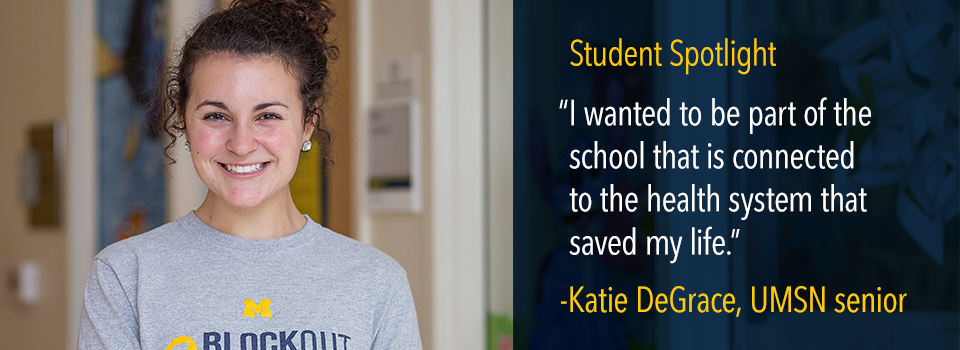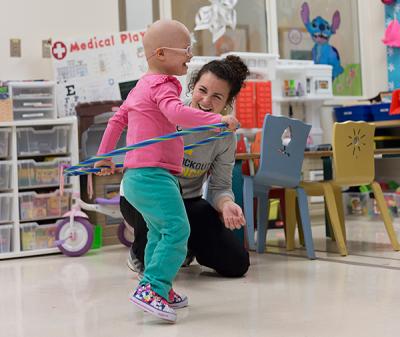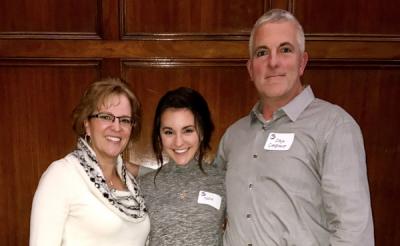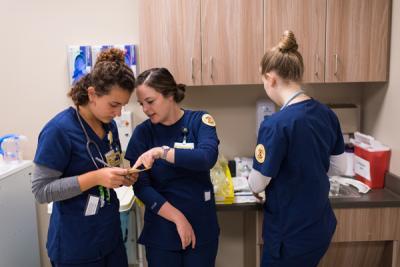Student spotlight: Stage four cancer survivor provides inspiration and awareness

Katie DeGrace was just ten years old when subtle signs of trouble began to appear. It was the late summer of 2006 when she started having occasional stomachaches, fatigue and fevers.
“I was always an active kid but I didn’t want to do many things,” said DeGrace, a native of Frankenmuth, MI. “I didn’t feel well, but then the symptoms would wane and I would be okay. I had always been healthy so we didn’t think something was seriously wrong.”
Soon the symptoms began to intensify. One day in October, the pain in DeGrace’s abdomen became so intense, she was taken to a mid-Michigan hospital. The health care team first discovered an elevated marker in one of her tests. Then, they found the mass.
“It was a Thursday,” said DeGrace. “They referred us to the University of Michigan’s C.S. Mott Children’s Hospital for a consult on Friday and told us we should be prepared for surgery on Monday.”
But that’s not what happened. During the first appointment, the health care team discovered that DeGrace’s tumor had ruptured. Within an hour of her arrival in Ann Arbor, DeGrace was being prepped for surgery.
“No one had said cancer yet,” she said. “It was just a mass at that point. But a doctor came out during the surgery and told my parents it was stage four ovarian cancer. They needed my parents’ consent to put in a port during the surgery.”
The doctors removed a tumor the size of a deflated volleyball during DeGrace’s nine-hour surgery. After that, her cancer treatment began immediately.
Over the next four months, DeGrace endured multiple rounds of chemotherapy. In February 2007, she was pronounced cancer free.
“Considering my diagnosis, the fact that I was cured so quickly was a miracle,” said DeGrace, who has maintained a clean bill of health for the past ten years. “I should be dead.”
Choosing UMSN
 When it was time for DeGrace to think about college and her future career, health care was the obvious choice. She considered becoming a physician and specializing in oncology, but when she thought of the nurses who had cared for her, she felt that was the best fit for the type of work she wanted to do and her personality. DeGrace applied to the U-M School of Nursing (UMSN).
When it was time for DeGrace to think about college and her future career, health care was the obvious choice. She considered becoming a physician and specializing in oncology, but when she thought of the nurses who had cared for her, she felt that was the best fit for the type of work she wanted to do and her personality. DeGrace applied to the U-M School of Nursing (UMSN).
“I wanted to be part of the school that is connected to the health system that saved my life,” she explained. “U-M has been really special to me. I knew if I came to school here, that I’d have that connection.”
DeGrace is now a UMSN senior. During her education, she had clinical experiences in a variety of general and specialty areas of nursing, but perhaps not surprisingly, found herself drawn to pediatric oncology. She even got a job as a tech on 7-East at Mott where she was treated. Now she’s working with and learning from some of the same nurses who cared for her.
“Some days it’s overwhelming, but I feel like I’m here for a reason,” she said. “I can’t help but look at some of these families and think, ‘this was me and my family.’ To be able to work here and be even a small part of helping them is the biggest blessing.”
DeGrace also joined the U-M student group Next Generation Ovarian Cancer Alliance.
“We raise money to support ovarian cancer groups and we work on education and awareness,” said DeGrace. “Ovarian cancer usually affects post-menopausal women so one of our big goals is making sure students our age know the signs and carry that message to their mothers and grandmothers.”
 In addition, DeGrace freely shares her own experience.
In addition, DeGrace freely shares her own experience.
“You don’t look at a 10 year old and think about ovarian cancer,” she said. “Both of my grandmothers had breast cancer but it had come much later in their lives. So even though cases like mine are extremely rare, people should know it is a possibility.”
Symptoms and stats
Only 1.3 percent of ovarian cancer patients are under age 20, according to the National Cancer Institute. It is most frequently diagnosed among women aged 55-64. Stage four survival rates, like DeGrace’s case, can be as low as 17 percent depending on the type of ovarian cancer.
Because ovarian cancer symptoms like bloating, abdominal pain and feeling full quickly while eating can be subtle and easily confused with other ailments, early-stage ovarian cancer is diagnosed in only 15-20 percent of cases. However, when caught in the early stages, most forms of ovarian cancer have survival rates higher than 90 percent, showing the importance of early detection.
Moving forward
 While DeGrace’s cancer has influenced many steps in her life, she doesn’t let it define her or her time at U-M. She’s been a part of the equestrian team, played intermural sports and last summer she participated in a seven-week study abroad program in Italy through U-M’s Center for Global and Intercultural Study.
While DeGrace’s cancer has influenced many steps in her life, she doesn’t let it define her or her time at U-M. She’s been a part of the equestrian team, played intermural sports and last summer she participated in a seven-week study abroad program in Italy through U-M’s Center for Global and Intercultural Study.
Now just a few months away from graduation, DeGrace is looking forward to the future. She’s considering returning to school in a few years to become a nurse practitioner and she’s got ideas about improving long-term care for cancer survivors like herself. But first, she’s ready to earn traditional nursing experience.
“I want to work on a hematology/oncology floor, but I’m really just excited about being part of such a special field. I don’t know where I’ll end up but as long as I’m working with patients I’ll be happy.”





